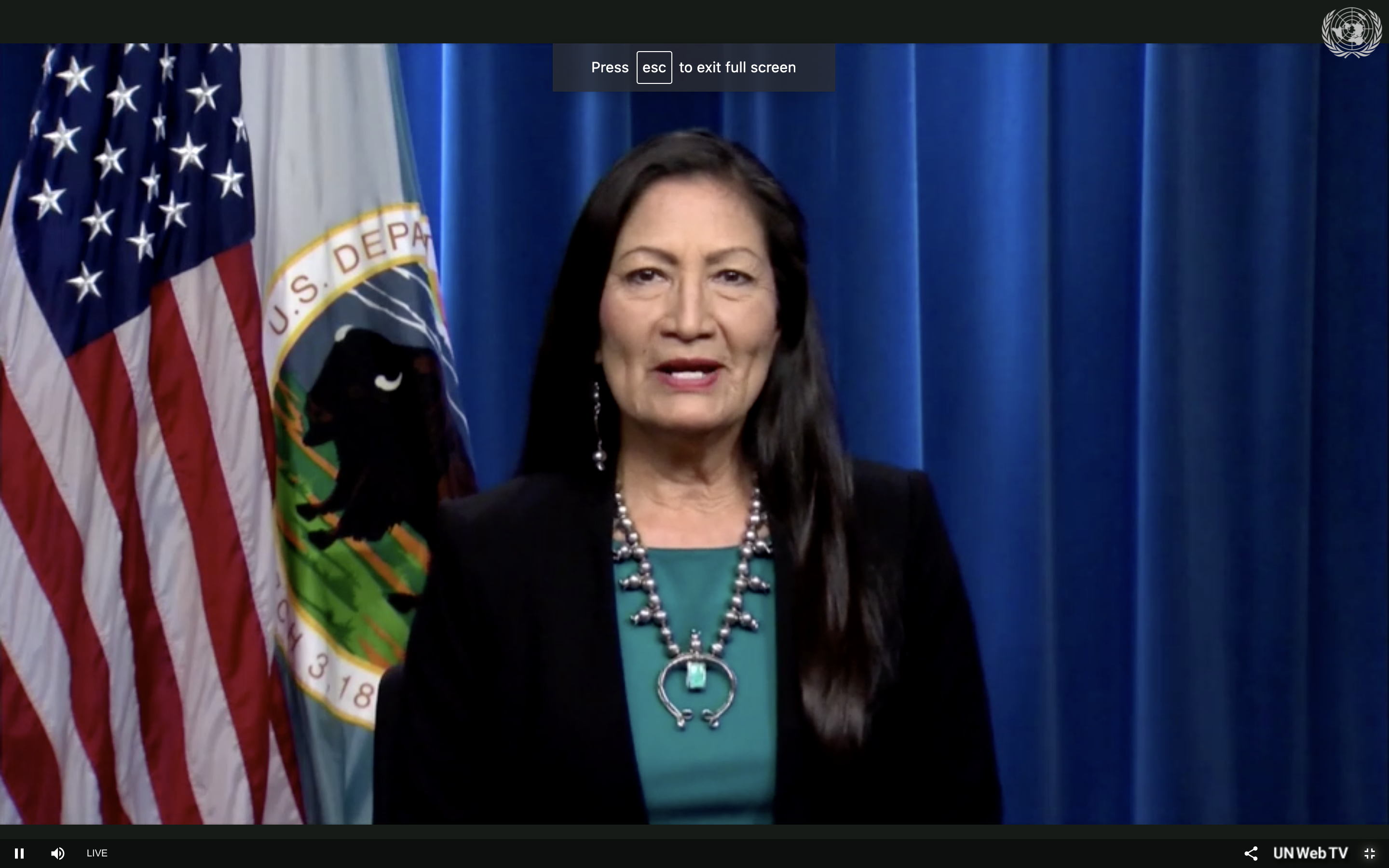
- Details
- By Jenna Kunze
Department of Interior Secretary Deb Haaland (Pueblo of Laguna) addressed leaders from across the world at the largest global gathering on Indigenous Issues hosted by the United Nations on Monday to deliver a keynote address.
The United Nations Permanent Forum on Indigenous Issues (UNPFII) is an advisory council, established in 2000, that advocates for the social, economic and cultural rights of Indigenous peoples. The two-week-long forum, held in a hybrid format of in-person and virtual speakers, was built around the theme peace, justice, strong institutions, and implementing a sustainable development goal “to promote peaceful and inclusive societies for sustainable development, provide access to justice for all and build effective, accountable and inclusive institutions at all levels,” group Chair Anne Nuorgam said in a statement.
Secretary Haalanad addressed the forum via live stream from Washington D.C., first acknowledging where she stood as the ancestral homelands of the Anacostia and Piscataway people.
Haaland said that the Covid-19 crisis has shone a spotlight on the disparities that exist in Indigenous and marginalized communities across the nation, and challenged leaders to address the interlocking challenges of injustice and the climate emergency.
“It is Indigenous resilience and worldview that every government, country and community can learn from so that we manage our lands, waters and resources, not just across budget years, but across generations,” Haaland said.
Haaland recognized the Biden administration’s approach to meeting comprehensive problems with comprehensive solutions.
“We've unleashed a whole of government approach to use nature-based solutions to conserve 30 percent of our U.S. lands and oceans by 2030 as part of an international push for conservation, restoring balance to lands, animals, plants, waters, and all living things that sustain life; to closely coordinate with us Indigenous communities in our Covid-19 response efforts; to partner globally ensuring Indigenous peoples in all marginalized communities have access to vaccines, testing and treatment; to put the full weight of our federal government and across departmental and interagency missing and murdered unit and continue to cooperate with Canada and Mexico and other member states to combat violence against Indigenous women and girls and to work with the international community on our repatriation efforts to realize a global commitment of honoring and caring for all Indigenous peoples, their lands, languages, cultural heritage and sacred spaces,” Haaland said.
In her third week on the job as head of the Dept. of the Interior, Secretary Haaland announced the creation of a new unit to investigate and solve cases of missing and murdered Indigenous women.
Weeks later, Haaland issued two Secretarial Orders that will prioritize action on climate change throughout the Department, one establishing a Climate Task Force to coordinate work across the Interior Department, and the other revoking a series of Secretarial Orders issued by the previous administration that are inconsistent with the Department’s commitment to protect public health; conserve land, water, and wildlife; and elevate science.
In her closing remarks on Monday, Haaland mentioned that the White House Council on Native American Affairs will hold its first meeting under the new administration this Friday, April 23.
“I hope to address Indigenous issues through this council,” she said. “Though this difficult moment has been thrust upon us. It's an opportunity to usher in a new era of peace, justice and strong institutions. But we will only rise to this moment by acknowledging the collective power of Indigenous peoples, and by doing it together.”
Additional keynote speakers on Monday included the Minister for Foreign Affairs of Finland, Pekka Haavisto; the Vice President of Bolivia, David Choquehuanca Cespedes; and Chief of the Onondaga Nation Tadodaho Sid Hill. More than 80 events are scheduled to take place during the two-week conference, organized by Indigenous peoples’ organizations, UN Member States, UN entities, intergovernmental organizations, NGOs and other stakeholders. For additional information on the conference, or to tune in, view the itinerary here.
More Stories Like This
Native News Weekly (August 25, 2024): D.C. BriefsNavajo Nation Mourns the Passing of Former Vice President Rex Lee Jim
Deb Haaland Earns Endorsement From Communications Workers of America Local 7076
University Soccer Standout Leads by Example
Two Native Americans Named to Democratic Congressional Campaign Committee's“Red to Blue” Program
Help us defend tribal sovereignty.
At Native News Online, our mission is rooted in telling the stories that strengthen sovereignty and uplift Indigenous voices — not just at year’s end, but every single day.
Because of your generosity last year, we were able to keep our reporters on the ground in tribal communities, at national gatherings and in the halls of Congress — covering the issues that matter most to Indian Country: sovereignty, culture, education, health and economic opportunity.
That support sustained us through a tough year in 2025. Now, as we look to the year ahead, we need your help right now to ensure warrior journalism remains strong — reporting that defends tribal sovereignty, amplifies Native truth, and holds power accountable.
 The stakes couldn't be higher. Your support keeps Native voices heard, Native stories told and Native sovereignty defended.
The stakes couldn't be higher. Your support keeps Native voices heard, Native stories told and Native sovereignty defended.
Stand with Warrior Journalism today.
Levi Rickert (Potawatomi), Editor & Publisher

